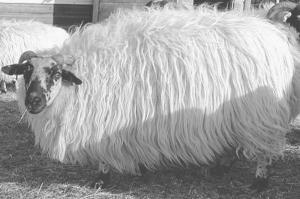2006 - Volume #30, Issue #5, Page #07
[ Sample Stories From This Issue | List of All Stories In This Issue | Print this story
| Read this issue]
"Goat - Like" Sheep Breed Good For Tough Conditions
 |
They are very distinctive looking, with large curled horns and a roman nose. The horns are similar to the wild Big Horn Sheep's and they produce a coarse, long wool fleece.
The Scottish Blackface is raised here mainly for meat, but the wool is good for carpets and rugs. In the U.K., it is valuable for making into "tweed" fabric. The meat has a nice, mellow taste.
"These sheep have a good, hard, black hoof that takes basically no maintenance," says Ron Bowick, a Canadian breeder. "That's a big plus, especially on my type of peatland pasture. I almost never have to trim any hooves."
According to the Barrhead, Alberta man, these sheep are in demand with stock dog trainers because people who compete at stock dog trials have had their dogs completely shut down when these sheep have been used in competitions. The dogs aren't expecting, or used to, such aggressive sheep, and have been sent flying.
"This breed is very tough, with goat-like foraging habits. Because of their aggressiveness with predators, they have a reputation for having ębad attitudes,' but they are exceptional mothers and can survive harsh conditions thriving on poor quality forage," he explains.
"They are tougher when it comes to most ailments and recover on their own more easily," he explains. "Problems have to be fairly severe before you can even tell that there are any. For example, they won't even limp until they've practically lost a toe. They also have a higher resistance to intestinal worms."
Bowick believes he may have the largest herd of this breed in North America, with 105 females. He doesn't think there are even 1,000 in all of Canada.
Both the ewe and ram have horns, but the ewes' curve into a "C" shape, while the rams' develop a full curl. Bowick has a ram with 37-in. horns measured from the base to the end of the curve.
He once had someone contact him looking for sheep with big enough horns that they would be suitable for his hunting preserve, but Bowick didn't have any that were old enough at the time.
Bowick sells 20 sheep per year for breeding stock, with animals going to Ontario, Manitoba, Saskatchewan, and B.C., to date.
Contact: FARM SHOW Followup, Ron Bowick, R.R. 1, Barrhead, Alberta, Canada T7N 1N4 (ph 780 674-4349) or The Scottish Blackface Sheep Breeder's Association, 1699 HH Hwy., Willow Springs, Mo. 65793 (ph 417 962-5499 or 417 962-5466; sbsba@pcis.net; www.geocities.com/blackies_sbsba/sbsba).

Click here to download page story appeared in.

Click here to read entire issue
To read the rest of this story, download this issue below or click here to register with your account number.




